- New female farmers that are part of Brazil’s Landless Workers’ Movement (MST) are embracing beekeeping and agroforestry on land that was previously unproductive and worn out by pesticides and fertilizers.
- The workers’ movement seeks to rectify land inequality by helping families occupy, settle and farm on land throughout the country.
- People are initially given unproductive land and are taught agroecological techniques based on organic and regenerative farming.
- In the past five years since they started tending to the land, the new beekeepers and farmers say there have been improvements in soil quality, reduced soil erosion and higher bird and native bee diversity in the region.
PARAÍBA VALLEY, Brazil — Under the frigid morning air of the Mantiqueira Mountains in southeastern Brazil, honeybees begin leaving the hive.
“When day breaks they are calmer,” says Mara Galvão, a smallholder farmer and beekeeper who is part of the rural agrarian reform settlement Nova Esperança in the Paraíba Valley.
Nestled between mountains connecting the states of São Paulo, Rio de Janeiro and Minas Gerais, Paraíba Valley is home to half a dozen of the more than 500 agrarian reform settlements of the Landless Workers’ Movement (MST) spread across Brazil. One of the largest social movements in the world, MST has generated controversy among politicians and public opinion for its ideological structure inspired by Marxism and methods promoting land occupations.
The movement seeks to help landless families occupy, settle and farm throughout the country based on Brazil’s 1988 Constitutional promise that land should “serve a social purpose.” In the South American nation, persistent land inequality has further spurred the movement — about 10% of the largest farms occupy nearly three-quarters of agricultural land. The movement embraces food sovereignty and environmentalism.
So far, the movement has led more than 2,500 land occupations, with about 370,000 families settled on 7.5 million hectares (about 18.5 million acres) of land.
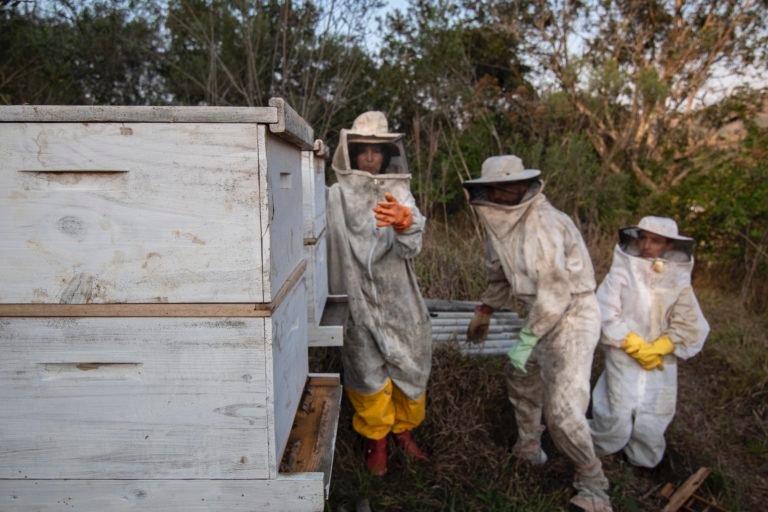
In recent decades, this has meant that the movement increasingly embraces sustainable agricultural practices for camponês (rural farmers), especially agroecology, as key to its strategy. And for people now living in the Nova Esperança and Egídio Brunetto settlements, this strategy has also translated to beekeeping within agroforestry systems.
“Working with beekeeping alongside agroecology feels refined and brings a touch of sophistication to [our] bee products,” Galvão tells Mongabay. “Reproducing this traditional technique also gives us certainty that the species will perpetuate.”
Read more: ‘Viable, just & necessary’: Agroecology is a movement in Brazil
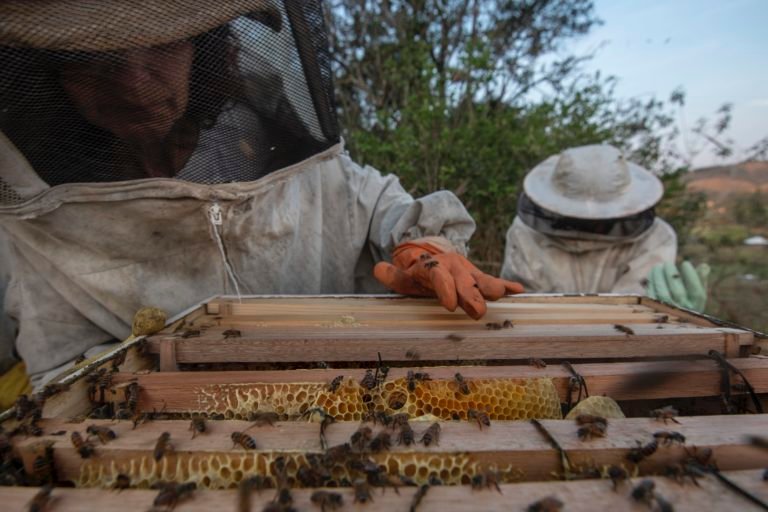
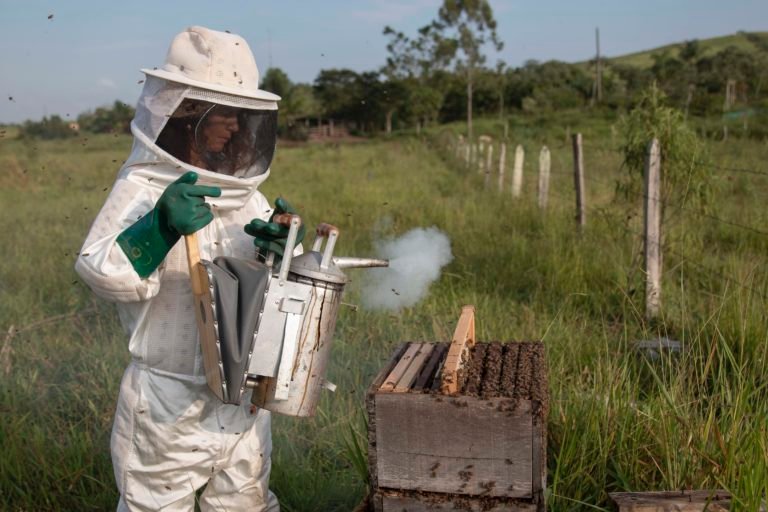
Collective learning lies at the heart of the agrarian reform settlements scattered around the country. To increase the social, political and technical education of its members in agroecology and beekeeping, MST holds local, regional and national events with the presence of scientists, government professionals and community members. Through these exchanges, local women try to increase their role in the community’s economy.
A local MST leader, Galvão lives with her three children on a small farm where she raises bees alongside her crops of corn, beans, cassava, peanuts and native fruit trees such as cambuci (Campomanesia phaea) in an agroforestry system.
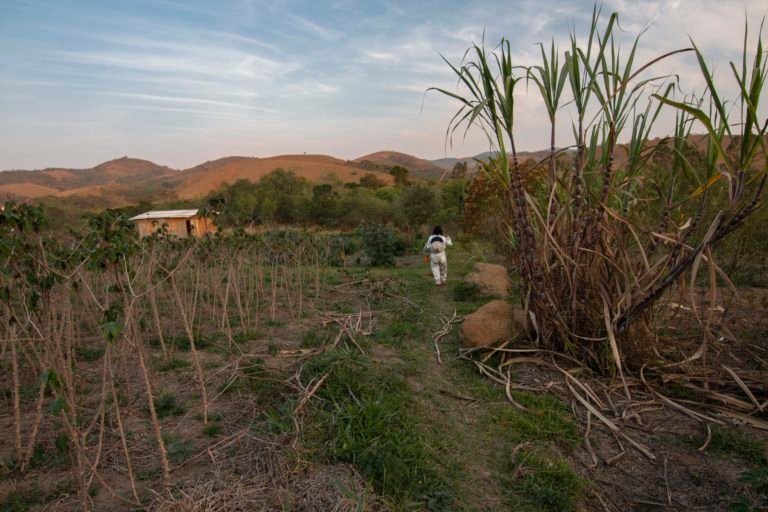
Considered the most important pollinators in the world, studies show that the integration of bee populations in agricultural practices improves crop yields, income and still preserves biodiversity and ecosystem services. The use of agroforestry systems with biodiverse sets of plants such as Brazilian peppertree (Schinus terebinthifolia), strawberry guava (Psidium cattleianum) and the threatened palm (Euterpe edulis), plus a mosaic of cultures like cassava, beans, okra, peppers, orange and medicinal herbs in creole varieties, are techniques that families have applied to boost yields and improve soil fertility. Families in northeastern Brazil’s Alto Jequitinhonha region have held out against industrial farming by preserving dozens of these traditional seed varieties through generations of family farming.
Responsible for most pollination in the world, the ecological role of bees is pivotal for the ecosystem as a whole, emphasizes Andrea Sendoda, an environmental specialist part of a technical program of São Paulo’s secretary of agriculture.
Read more: More trees means healthier bees, new study on air pollution shows
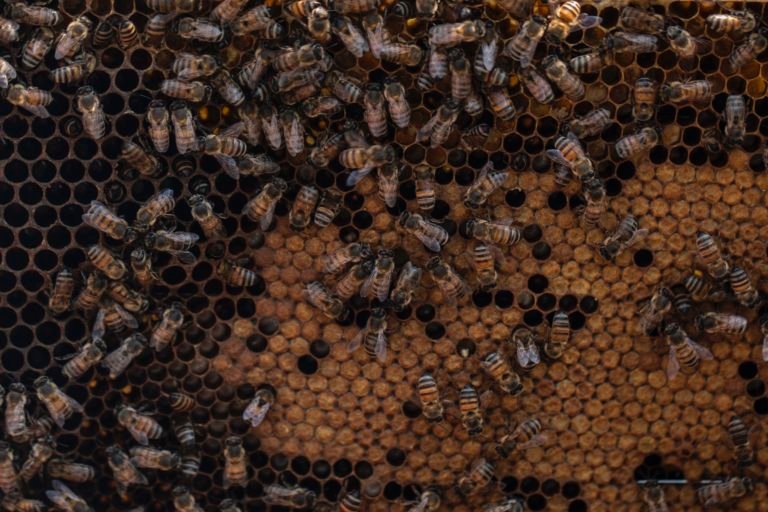
Like many other rural reform settlements, families start off on plots of land that are worn out, infertile, unproductive and extremely dependent on the fertilizers and pesticides to which they have adapted. Sendoda is responsible for guiding communities on the protocols for transitioning from conventional to organic and agroecological practices. This transition requires European honeybees (Apis mellifera) — lots of them.
There are 55 plots of family land of the Egídio Brunetto Agroecological Settlement, nearby Nova Esperança. All families apply agroecological techniques and practices in land management, which includes diverse agroforestry systems. The beehives are scattered throughout the plots of land. Each family has about five bee boxes.
Like other women in the beekeeping collective, Daniela Ferreira also noticed improvements in soil quality, fertility, enhanced water storage, reduced soil erosion and higher bird and pollinator diversity (including native bees) since they started tending to the land about five years ago.

“Many practices are inherited from traditional communities, Indigenous peoples, Quilombolas [Afro-Brazilian resident of slave camp settlements], and need to be adapted to the local context,” says Marília Gaia, professor in rural education from the Federal University of Santa Catarina.
The sale of beekeeping products is Galvão’s main source of income. She produces and sells about 30 kg (66 pounds) of honey per month, which brings an income of approximately 1,200 reais ($237). Bee products have high market potential and, even while done at a small scale, bring an increase in household revenue and greater female participation in family budget decisions.
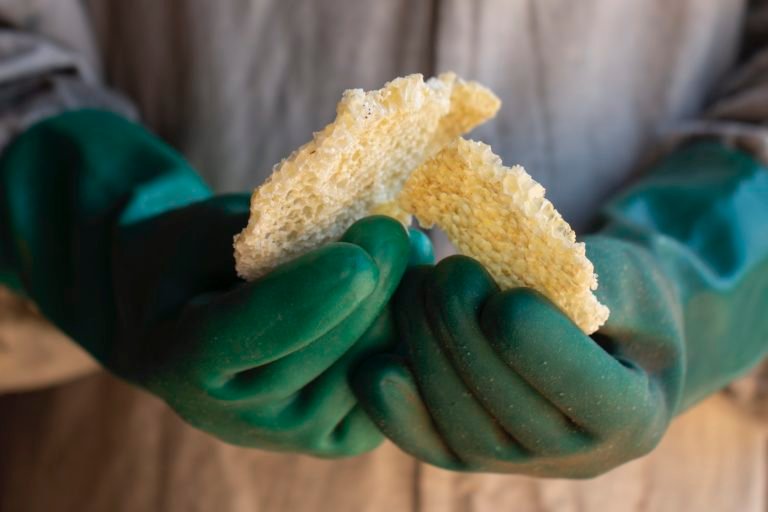
Aiming to share knowledge and offer the possibility of additional income to family farmers in Egídio Brunetto, Galvão was among the members of MST who offered beekeeping courses at the settlement’s School of Agroecology Ana Primavesi. Teaching about colony transfer, queen catching, harvesting and the transport of hives, she helped launch their beekeeping collective, currently formed by eight families and led by women.
Read more: Enhancing biodiversity through the belly: Agroecology comes alive in Chile
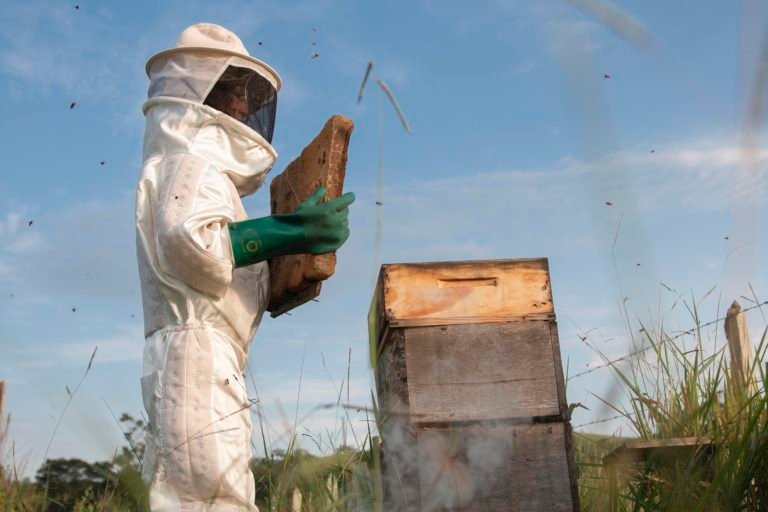
“It’s without a doubt a woman’s biggest source of income,” Ana Câmara, a member of Egídio Brunetto’s beekeeping collective, tells Mongabay. “It’s totally different if it’s the woman who’s doing a job and the money is coming through her. She manages to do another type of planning with the income that comes from a practice that is only hers.”
Ferreira agrees, “The collective brings to women knowledge and financial autonomy, while bringing us closer to the old cooperative modes of production.”
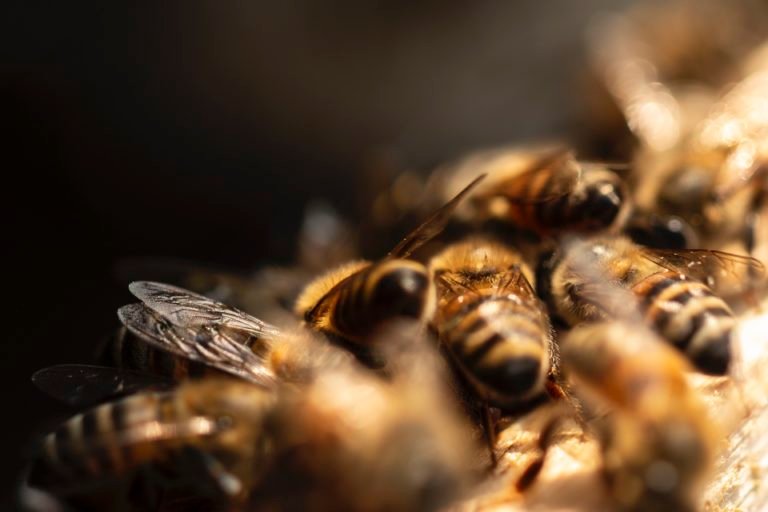
Citation:
Garibaldi, L. A., Steffan-Dewenter, I., Winfree, R., Aizen, M. A., Bommarco, R., Cunningham, S. A., … Klein, A. M. (2013). Wild pollinators enhance fruit set of crops regardless of honey bee abundance. Science, 339(6127), 1608-1611. doi:10.1126/science.1230200
Banner image: Alda prepares branches of wild rosemary (Baccharis dracunculifolia) to use as a duster to keep bees away during handling. An essential plant for bees, the wild rosemary also has a great capacity for regeneration and can be successfully used in the recovery of degraded areas. Image by Inaê Guion.
Related listening from Mongabay’s podcast: We speak with food expert Anna Lappé on the growing adoption of agroecology around the world, and behavioral scientist Philipe Bujold on encouraging small-scale farmers to adopt sustainable farming practices. Listen here:
‘Beenome’ project aims to boost bee conservation with genetic mapping
FEEDBACK: Use this form to send a message to the author of this post. If you want to post a public comment, you can do that at the bottom of the page.












